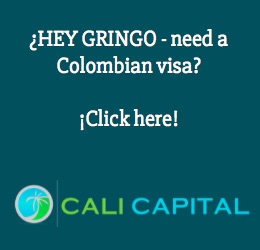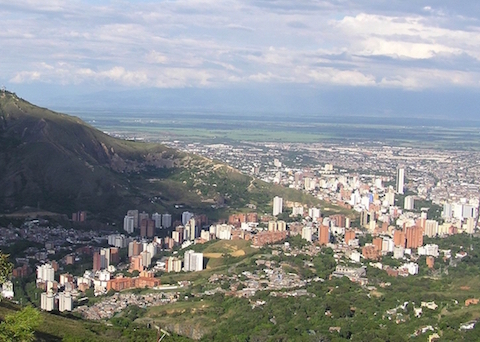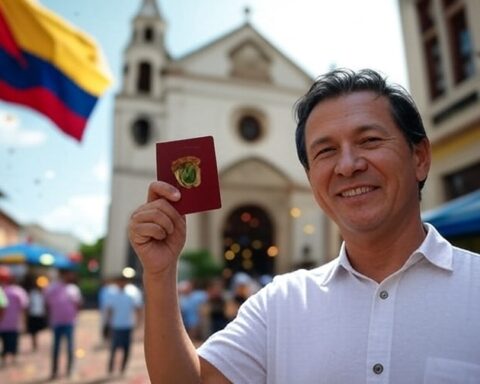This post applies to people interested in starting a business on the ground in Colombia. Being a stranger to how the system worked here, I found the process to be awfully complicated, compared to my home country, where one may open a business in 15 minutes online through a government website.
Navigating Colombian bureaucracy can be quite a challenge sometimes, so with a personal mission of spending a little bit of time each day helping other people, I decided to document the steps necessary to starting a business in Colombia, hoping to make the process more transparent for aspiring entrepreneurs.
Below are your seven steps to forming a legal entity and getting you started on your business adventure. I formed a SAS-corporation. If your legal structure is different, your steps may vary a bit, but this text should still be very useful.
1. Lawyer – abogado
The very step you need to take is find a lawyer who can help you with the legal framework for your business which includes choosing what type of corporation you should form: Persona natural – the one-man operation or Persona Jurídica in the form of a structure like a S.A., S.A.S., S.C.A. etc. Your lawyer should be able to explain you the benefits and drawbacks of each model and help you choose what is best for you. Then comes your razón social or stated purpose of the business, the name of the company, the amount of start-up capital and who will be the legal representatives of the company. All of this will be written into your into the estatutos de la empresa – your corporate constitution – which you will need to copy and authenticate at a notary before registering and leaving your copy with the local Chamber of Commerce, la Cámera de Comercio (step 3).
TIP! Check here to verify that the name you have in mind for your business is not already taken.
I paid 2 million pesos ($750 USD) to setup my SAS and my lawyer is far from the cheapest one around. I chose him because his English is perfect and his experience immense. He has already retired and really only keeps working because he loves his work. What I didn’t realize when I started to work with him was, that even though I was paying a little extra for his services, the real value came from being introduced to his network. In Colombia and most of Latin America business is very much based on personal relations. Getting recommended by an insider to the right people is critical for several reasons: It speeds up the process of pretty much anything you want to do and it ensures you that you will be working with gente de bien – good people – not to be underestimated in Colombia, where scam is unfortunately very common. My lawyer has introduced me to the builder that built my house, to my accountant, to participate in private equity offerings, he has invited me to the country club that he’s a member of, he has invited me to sail a catamaran in Cartagena, to his finca in Lago Calima, he walked me into the Banco Davivienda branch manager’s office – skipping the line, he helped me support the institute for blind and deaf kids in Cali.. and the list goes on, but this should give you an idea of his influence.
Make sure to quote a few lawyers on price and their competences before you choose who to work with. If your Spanish is not very good, find one that speaks English, which a lot of them actually do. Your lawyer may not go as far as mine, but make sure to choose one where the chemistry between you is good – someone who understands you. I found my lawyer by contacting Invest Pacific, an organization that helps companies invest in Cali and Valle del Cauca. I asked them if they could recommend me a lawyer and they provided me with a list with 8-10 lawyers, all of whom I talked to before making my choice. If that is not an option for you, then try asking local entrepreneurs for recommendations.
2. Accountant – Contador
Get yourself an accountant that can help you make setup up the balance – the assets and liabilities – for your business. Although it may seem obsolete as most new start-ups have very little of both, most banks will require to see it in order to open a bank account for your company. Also, it’s good to get the dialog started sooner than later, as your accountant can help with a lot of the technical questions related to getting your RUT and facturación, which will be explained in more detail below.
As mentioned above, my accountant was a recommendation from my lawyer. Unless you are a big multinational company, you do not need to hire PWC, Deloitte or the likes to get you started. I suggest choosing a small local accountant as it will be way more affordable and it is lot easier, cheaper and faster work with them. Make sure your accountant knows about and how to apply the Ley 1429 de 2010, that gives new entrepreneurs with less than 50 employees a long range of benefits, including 2 years free from corporate taxation. ¡Muy importante!
3. Chamber of Commerce – Cámara de Comercio
Once your lawyer has prepared your estatutos de la empresa and you have authenticated a copy of these papers at the notary, it’s time to visit your local Chamber of Commerce and register the papers in order to obtain what is called your Matrícula Mercantil and NIT – your business ID number with the Chamber of Commerce – all of which is documented in a Certificado de Cámara de Comercio. This certificate is your proof for having set up a legal entity. A lot of companies will ask for a recent (no older than 1 month) print of this certificate in order to do business with you, in order to ensure that your business in still a going concern. (That means you’ll have to visit the Chamber of Commerce and pay them around $10.000 pesos to issue the official document for you every once in a while.)
Each year you will have to renew your Matricula Mercantil and the price for this renewal is a reflection of the size of your business. For an overview of prices, look here. Applying for the benefits in Ley 1429 de 2010 mentioned in step 2 should give you the first two years for free.
When going to your local Chamber of Commerce to register your business you will need to bring the following documents:
– ID and a copy of your ID. Preferably your cedula or cedula de extranjería.
– Estatutos de la Empresa – the document that you lawyer made for you.
– The RUES form. This is your form for registering with the Chamber of Commerce. You accountant, lawyer or the clerk at the Chamber of Commerce will help with the parts that you don’t understand.
– The RUT form. This is for your tax ID. Click the link and choose which structure applies to you, print the form, fill out as much as you can with your accountant and bring it with you. I will explain more below in step 5.
With the documents listed above, the Chamber of Commerce will issue you a temporary NIT and a Pre-RUT that are only valid to open a bank account and nothing more. You will get somewhere between 15-30 days to open your account and if you fail to do so within this timeframe you will have to start the process all over again.
Remember that the person performing these tasks has to be a legal representative of you company.
Please note that the following terms: estatutos de la empresa, escritura publica, minutas de la empresa and documentos de constitución are used interchangeably for the same documents.
4. Bank account
With your temporary NIT and Pre-RUT, ID and the balance of assets and liabilities made by the accountant, you will go to the bank of your choice and open either a checking or savings account – cuenta de corriente or cuenta de ahorros. Grab a number and sit down. Don’t wait to see one of the cashiers, they are only for receiving money. You need to see an assessor, so make sure you get in the right line. Tell them that you need an account for your company and a document to verify it with the Chamber of Commerce and La DIAN. Don’t worry about online banking and credit cards for now, you can take care of that later.
I work with Bancolombia and BBVA, mostly for the LifeMiles they give me with Avianca. I won’t say that I like them because they, like all other banks in Colombia, are very expensive (10-20% annual interest are the norm) and slow compared to the banks in Europe that I have been working with before. I will say though, that personal relations will give you a way better service experience. Get a recommendation from a friend or business contact. I’ve heard good about Banco de Occidente as well.
5. Activate your RUT
Your RUT or Registro Único Tributario is your tax ID and comes in 2 versions: one for you as an individual tax payer and another one for corporations, and will be needed for everything related to billing and dealing with the Colombian tax authorities called La DIAN. All legal representatives of your company should have a personal RUT, so I’d recommend that you get both.
For this step you will need to book an appointment with your local DIAN, which you can do here. (If the link does not work, then go to the DIAN’s website and click on the blue icon labelled Asignación Citas in the right side of the page.) Please do not go without an appointment as you will be wasting your time. Just look at the line and see how many people they reject entry every day no matter how good their excuses are.
The purpose of this visit is to turn your corporate Pre-RUT into a RUT definitivo or permanent RUT. Tell them that you need to “Actualizar el RUT”.
You’ll need to bring the following documents for this appointment:
– ID and a copy of your ID. Preferably your cedula or cedula de extranjería.
– Your Pre-RUT from the Chamber of Commerce.
– Your temporary certificate with your NIT from the Chamber of Commerce.
– The document from your bank confirming that you have an account.
– If possible, bring a public utility bill to the meeting with the DIAN as proof of your business address.
The DIAN will activate your RUT and show you how to open an account with MUISCA – the DIAN’s online platform, which your accountant will need access to for future tax declarations.
Once done, you should be leaving the place with your RUT definitivo in your hand.
6. Permanent NIT
With you RUT and bank account established, you will need to return to the Chamber of Commerce, present your documents and have them remove the annotation on your Certificado de Cámera de Comercio that says “El presente NIT solo es válido para solicitar la apertura de cuenta corriente o de ahorros ante entidad bancaria. No será válido ante ninguna otra entidad o establecimiento como documento de Identificación Tributaria.”
Make sure to buy a few extra Certificados de Cámera de Comercio – you will need them when establishing new business relationships.
7. DIAN Facturación
Few things in Colombia are as straight forward as one could hope for, and this is one of those things that makes you shake your head, count to ten and remind yourself that this is the last step…for now at least.
The final step will have you to return to La DIAN (Remember to book an appointment using the link in step 5) and order your facturación, which your future “unique” invoice numbers. To issue any invoice in Colombia you will need to have this set of pre-approved invoice numbers, that are provided to you by La DIAN. If you plan on selling hamburgers they may give you 50.000 numbers. If you will be selling cars they may only give you 1.000. It depends on the nature of your business. I got from 0001-1000 on my first visit.
As if that wasn’t enough, you can’t just make your own invoices in an excel spreadsheet afterwards. Instead, you have two options and you have to let the DIAN know which option you choose when getting your facturación:
- Paper invoices: Hire a professional printing service to print your invoicing paper with your name, logo, NIT, corporate address and your unique invoice numbers including the total range of your numbers. They will print an original and a copy for each number. One for your client and one for your bookkeeper. They also have to put the name and information of their printing service on the invoice with small letters in the side margin.
If you screw up on one of your invoices that number is “dead” and you will have to use the next number in line, but remember to archive the “dead” invoice for potential audits.
A final thing that your invoice paper needs to include is information about your taxes. I’m no expert, but your accountant will tell you about Regimen Común/Regimen Simplificado, Retención en la Fuente, IVA (sales tax), Reteica, Resolucion DIAN No., … etc. To see what my invoice paper look click here. - Electronic invoices: Your second option is choosing an online invoice service like Alegra. This seems way easier and is what I would have chosen, had it not been for the fact, that I had already printed my first 500 invoices before learning about this online billing service.
If you plan on selling higher-volume items through a cash register like in a supermarket, your register will be programmed to contain all the necessary information. I’m sure your accountant and the person selling the equipment will help you set it up.
Final notes..
I did all of the above steps in Cali. Every Chamber of Commerce may have procedures that vary slightly compared to the steps above, but in any case they should be very similar. With time, hopefully this process will be smoother. Apparently, Medellín’s Chamber of Commerce is already in the process of making it possible to register your SAS online, although the page is currently out of service. I’ve been told that the Colombian government keep the process complicated on purpose, making life harder on criminals trying to launder money.
Depending on your business there may be other permits that you will need to acquire in order to operate legally. Examples could be, but are by no means limited to:
- Permit for commercial store called Uso de Suelo. You get this at the mayor’s office, La Alcaldía. This has to do with the city’s zoning requirements and makes sure that you don’t put a nightclub in a residential neighborhood and stuff like that.
- Environmental permits if your business has an environmental impact. In Cali you apply with El DAGMA. I’m sure your city has a similar organization.
- Approvals from the local firefighters for big construction projects, events, gas stations, restaurants etc.
- Permits to play music in public, which counts everything from waiting rooms at the dentist to nightclubs. The nationwide organization that handles the royalty payments is called Sayco y Acinpro.
- If you plan to produce or import any kind of food, beverage, lotion, shampoo etc. will need a sanitary permission known as a Registro Sanitario or Registro INVIMA, equivalent to a sanitary authorization with the FDA in the US. You can read more about these on the government website here or hire a company like my girlfriend’s to handle the application process for you.
- If you plan to produce or import any kind of toy, ceramics or electric devices you will need to obtain a Certificado de Conformidad before you can import and/or bring your products to market. You get it by sending samples to an approved laboratory, where they destroy the sample and makes sure it does not contain dangerous or poisonous parts and that it complies with Colombian regulations. ONAC is the organization responsible for approving the laboratories. Again, I suggest that you hire a company like my girlfriend’s to handle application process for you.
I’m sure you are aware, that Colombia is not the most attractive place to be an employee for most people. Luckily, there are plenty of opportunities in the market for entrepreneurs willing to go the extra mile and jump through all the hoops necessary to get started.
As a final tip, I recommend you to always have a scanned copy of you RUT and Certificado de Cámara de Comercio in your inbox that you can easily forward to someone directly from you smartphone. Trust me, it will come in handy.
Good luck in your business adventures. I’d love to hear from you in the comments below if this was useful or if you have any doubts.









You don´t need to have recommendations or contacts for everything, everything can be done by yourself… neither pay 2 million pesos lawyer … Chamber of Commerce explains you everything clearly and easily, though it was a good summary…. ( by the way,, I dont trust lawyers who claim to have contacts and network,,, sounds always shady to me… well lawyers always are)
Hi Adriana,
Thanks for reading and commenting.
You are totally right – it is possible to do many these things by yourself, especially if you are a Colombian and understand how the system works. Some of the procedures can be hard to navigate, especially if your Spanish skills are not the best. Nobody at my bank, DIAN or Chamber of Commerce spoke any English. As a foreigner I think it is outright foolish to try doing it all by yourself, especially without consulting a lawyer and an accountant.
Like the article said, I found out later that paying 2 million pesos for my lawyer was on the expensive side and can be found cheaper. I’d also like to point out that my lawyer never claimed or promised to have any contacts in his network that he was going to share with me. It came naturally as a consequence of the good chemistry between us. I agree it sounds sketchy if a lawyer starts promising things like that, before you have even started working with him.
Best,
Patrick
Thats right! Good job! The only thing is I agree with Adriana, Everything in the list is perfect except the lawyer part. We found a trustworthy Accountant and she helped us through the process.
We were able to get everything up and running in 1 week.
Good luck to everyone!
Hi Patrick, this is a pretty good summary, I just have a couple of comments:
– Ley 1429 de 2010 only applies to new companies that were registered up until 29 December 2014, so is unfortunately not of any use to people going through this process now;
– I agree it is sensible to have a lawyer involved if you are a foreign, preferably one who has experience with foreigners. For example, many Colombian accountants are advising people to do business as a ‘Persona Natural’ rather than set up a SAS. Whilst this often makes sense from a tax perspective, unfortunately they overlook the potential visa breaches – very few categories allow foreigners to do business as a Persona Natural, this is the type of value lawyers provide if you are serious about doing business here.
– Many banks require the company`s legal representative to have a cedula in order to open an account, so its best to check requirements with your bank before you decide who the legal representative will be.
– For those in Medellin, you can submit your forms at the Camara de Comercio de Medellin without the RUES form or pre-RUT and you can head to the DIAN in Alpujarra without an appointment.
– I work with a great lawyer here in Medellin with both local and international experience – you can contact her on mrob_ledo@hotmail.com
Hi Emma,
Great comments! Thanks for contributing and clarifying!
– Patrick
Thanks for your advise.
we are keenly interested to establish a L.L.C company in Colombia.Let me know the procedure of company formation and what so on.Hoping to receive a your positive response at your end.
Hi Asghar Ali,
Thanks for reading.. honestly, I think I’ve outlined the process as much as possible above. The rest is up to you 🙂
Patrick
But, even if you are going to finance the venture yourself, a business plan will help you figure out how much money you will need in order to get started; what needs to get done when, and where you are headed. How will these affect day-to-day operations?
Patrick if I may ask what type of businesses did you start. Maybe we can get into other fields pretty much in your same boat and looking to move to cali. Already bought a apartment there and looking for a business venture as well
Thanks for the info, I am possibly looking at Cartagena in the future. However I still need to formulate my business plan and decide if it is something I really want to do. Colombia seems great though, thank you.
Hi Patrick
Thanks a lot for posting this ..
this post solve my problem , i have given a presentation in my university that who u start business in colombia 🙂 🙂
Hi Patrick!
First, thank you so much for this great article! My friend and I, from France, are planing to open a business in Colombia. But I am a bit confused with the VISA with which we can come and work.
According to the business-owner VISA requirements: “… you must purchase shares in a corporation or own a business outright that shows your investment to be equal to or greater than 100 minimum salaries so you can Setup Colombian Company.”
Our business model isn’t the size of 100 salaries, and we’re planing to build our own company, not buying shares of a company. Is the solution to get a partner that open the business for us, and then buy all the shares?
Thank you!
Cheers
Hi Cindy,
As far as I know, you can start your own company but the investment has to be of at least 100 minimum saleries, which is about $25.000 dollars at the moment. That will give you access to the 1-year TP7 investor’s visa which can be revewed in the future.
Once you have your certificate from the Camara de Comercio and a balance confirming your investment – signed by public accountant – then you can take that documentation to the Migracion and they will make your visa. My girlfriend Jessy does visa applications if you need help.
🙂
Hi Patrick
Great article I have a number of questions and possibly some work for you in the future if you we’re interested. Could you possibly drop me a note and we could communicate directly.
I am at tta225s@yahoo.co. uk
Many thanks
Adrian
PM sent
Hey Patrick, I’m thinking about oppening a business in Colombia and have a number of specific questions. Can I drop you an email asking them? I just put my address here, so can you send me one and I’ll answer it with the questions?
Thanks in advance.
Hello Patrick,
What a great and informative post. Thank you for spending the time writing it.
Very helpful.
Already wrote to the attorney “Emma” had mentioned in Medellin.
We in engineering/construction/ GIS software and services business. Thinking about starting same in Medellin (or Bogota, not sure yet). We have been based in the U.S. since 1983.
Regards,
Kambiz
PM sent
hi i want take my panama company that is working in panama and open operation in Columbia in the capital . can you send me a great english speaking lawyer .
PM sent
Hi Patrick,
Great article, covers all bases with simple explanations., Thank you for posting this.
I would love to get in touch with you for some more questions, I am planning on visiting colombia in the following month. Can we get in touch. Please ping me on ashwin29787@gmail.com.
Thanks
Ashwin
Hi, My name is Hassain. I will be soon moving to Colombia for my job with a two years work Visa. While I stay, I wish to start an Agricultural Business Company which is focused on sustainable agriculture products for Industrial uses. Will the process be same for me or would there Major variations?
Hi Mohammad,
The process to start your business will be more or less the same. Depending on your business, there may be some certain licenses that you will need to obtain. If you wish, I can put you in contact with a bilingual business lawyer who can advise you on the process?
PM sent
Patrick,
Great information. Could you connect me with the bilingual business lawyer you used. I am planning to set-up a company in Colombia and will be in Cali next month. Thanks, Jim.
Hi Patrick
I wanted to commend you and thank you on the marvelous job you did to help other future entrepreneurs venture in Colombia ….
I have a question …
I would like to imports some goods to Colombia … would you have any information to share in the field of import, customs, brokers, taxes, trucking … etc? Your support is greatly appreciated …
Best,
Youssef
Hi Patrick, thanks so much for this informative post.
I’m interested in starting a business in Bogotá. Do you know of any orgs similar to ‘Invest Pacific’ for that market or perhaps any lawyers or accountants that might be able to help there?
Ruben,
Did you follow through? What are you up to now?
Yeah, Starting with a lawyer is a good move if you’re not from there. I lived in Cartagena for 3 years and man, They want to get every little piece of you as an expat. If you earn money back in the US they want a portion, If you own $500k or more in assets you’re subject to the wealth tax. It’s a whole different animal than the US. You want some professional assistance for sure.
hi my name is Syedhasanalishah and i am intrested in opening a institute in colombia in which people can come and we can teach them English. what will be the procedure.
Hi, syed.
I am considering something similar, although very early thinking. Not due there until January.
How far along are you and do you think viable market?
Also considering bar/cafe/cycling related
Cheers
Dave
Adrian , in 24 years old Colombian but living in the usa. I’m about to go to cartagena and open a restaurant. What business did you start? And did you use a small business loan?
Hi Cindy!
I was reading your comment , im From finland im thinking to move to colombia or brazil as well to open a bussiness or have a partnership, are you in colombia already ? what type of bussiness you open? do you need a partnership ? I can come in with 20k.. And I speak 4 languages
Hi Miguel – check out the options on FAR International for investing $25K and earning 8% returns.
Hey Patrick. I’m living in Cali and I’ve got a few questions with regards to businesses. Could you PM me please? Best, Jess
Hi Patrick,
Great read and informative. Please could we communicate directly regards a business start up I want to introduce in Colombia. Your knowledge and advise would be helpful.
Thank you.
Reggie, send me your questions to patrick@caliadventurer.com and I’ll try to help.
Hi,
I am thinking about importing some animal extract from colombia. But suppliers want me to take care of shipping and export document. So I think I have to set up a company only for handling export process and buying product locally. The location would be Bogota.
If you guys know any good lawyers in Bogota speaking English well, please let me know the contact info. Thx.
John
Hi Patrick, I’m American Citizen and trying to start a business in Cartagena, Colombia. Is there an email where I can reach you?
Correct. It does sound shady. Can you recommend an English speaking Lawyer to me?
Hi Patrick. Please also recommend an English speaking lawyer to me?. I already have a business here but need to change its legal status.
PM sent
Patrick, thanks a lot for taking the time to write this. Coming from a Caleño, this is very very helpful. Muchas gracias!
Thank you much for this article. I just recently retired from military service in the US and strongly considering moving to Colombia to open a business. This definitely gave me an idea of what I can expect.
I am interested in starting a business in Colombia and I am in NY and US Citizen would you please send me details on starting my investment and consulting business in Colombia.
I am not looking for a visa / permanent residence in Colombia just a startup business in Colombia for an Investment Opportunity and Consultancy services.
I would appreciate any help that you can extend.
Thanks,
Chris
Hi Patrick. Great article. Could you recommend an English speaking lawyer to me please? Many thanks
Hi Liz, sent you a PM last week
Hey Patrick,
I’m currently looking at what it might take to start a Montessori school between Palmira and Cali and I’m kind of trying to figure out the need for the school. Whether it should be in Palmira or Cali and the school thing is quite complicated in the sense of donation and not a donation for being a private school. I looking for parents support to make this a reality. You mentioned a lawyer for education or business in general and an accountant. Perhaps you might have some I can chat with? Thanks
Laura
Asghar I’m selling a Colombian SAS established over 2 years ago and in good standing if u r interested
I know it’s been quite a while since your post, but do you have any established S.A.S. Corporations for sale now?
If you do have S.A.S established available, please contact me northernpowerinitiative(@)gmail.com. Thank you!
Patrick,
Great article!
My wife and I are planning on moving to Cartagena to start a craft distillery with a pub room.
Can you recommend an English speaking attorney in Cartagena that has experience in the distillery and bar restaurant business?
Hola Julián, Bendiciones.
Se que van 4 años de este post.
Abriste al fin el Restaurante?
Mi nombre es Ray y vivo en New York, soy chef y quiero volver a Cali a abrir un restaurante de comida rápido Americana/Internacional, ya que ese es mi fuerte acá en USA y Puerto Rico y creo que ya es hora de volver a casa después de 36 años acá y me gustaría saber como está todo allá en Colombia
Déjame saber cómo te está saliendo tu proyecto.
Dios te Bendiga
Ray